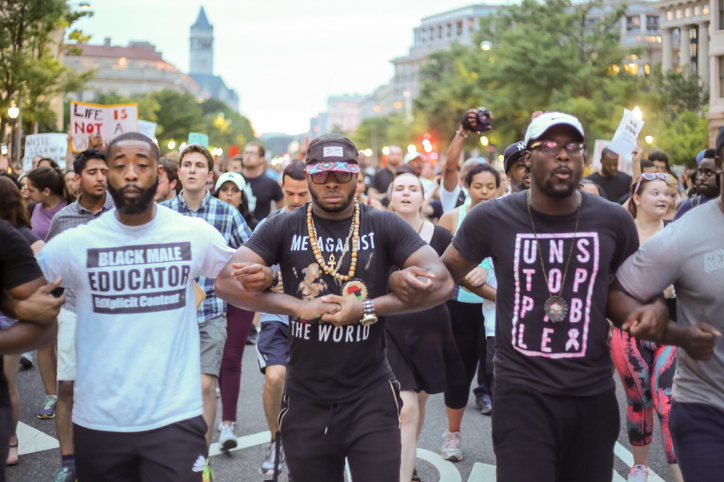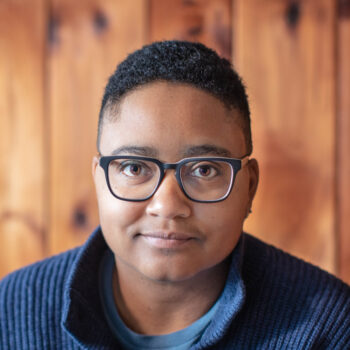The COVID-19 pandemic has exposed our deadliest weaknesses: our lack of public health investment, our bankrupt healthcare infrastructure, an economic system that treats women and people of color as expendable, and, of course, the racist system of policing that upholds that economic system.
Consider the death of George Floyd at the hands (knees) of police in Minneapolis. Derek Chauvin, the officer who murdered Floyd, had 18 previous complaints against him, but the Police Officers Federation of Minneapolis — the makers of the “Cops for Trump” t-shirts — helped block his removal. While Jobs With Justice supports all workers who wish to form a union and have a voice on the job, George Floyd’s murder is yet another example of a local police union that spends more time nurturing a culture of white supremacy and violence than democratizing the workplace.
The systemic racism in our society has infected much more than just local police unions. To protect their own lives, Black people routinely manage the fear and anxiety of white people. Take one recent example. While collecting takeout from a local business with my daughter, I had to estimate the anxiety levels of the white woman in front of me, who seemed to follow my every move. I worried that she thought I’d kidnapped my pale-skinned child and would call the police.
Ahmaud Arbery likely felt the same anxiety as he tried to jog around that pickup truck; so did George Floyd as he tried to reason with police officers who automatically considered him a dangerous suspect. So did Rayshard Brooks. So did Breanna Taylor. Unlike them, I escaped with my life.
Yet these tragedies have also fostered authentic solidarity. Union bus drivers in Minneapolis refused to help police transport protestors to jail. Mutual aid funds have emerged all over the country, even in the smallest towns, to support the families of those out of work or struggling with the virus — especially those who might be overlooked by federal aid, such as undocumented immigrants and the formerly incarcerated.
Never has the need to collectively negotiate over our working conditions been more important, not just for workers but for everyone. When workers get sick, our communities get sick. When workers have a plan, our communities are safe. Many union nurses already had plans in place for potential biomedical crises like this. Many of their collective bargaining agreements took all of us into account — far beyond what is considered mandatory by U.S. labor law. At my local union grocery store, they have an extensive system for social distancing. They have personal protective equipment. They fought for a plan, and now our community has the confidence that we can safely shop. Meanwhile, down the street at Walmart, the circumstances are less consistent. This doesn’t just impact the workers but every exhausted shopper who stumbles in looking for diapers.
Luckily, we are not without the tools we need. To Harriet Tubman’s lantern and shotgun, we have technology, resources, and relationships.
First, there’s plenty of money. We have generated plenty of money under global capitalism, through our labor, our rents, our debts, our purchasing. There’s plenty of money, and it’s ours. We created it. Together, we can campaign to collectively win that money back — by inserting ourselves into decision-making processes to expand democracy in both the political and economic arenas.
Second, we have the machines and technology we need, they’re just used to benefit the wrong people. This pandemic has shown us what happens when the invisible hand of the market gives you the finger. Our inability to produce and distribute ventilators to hospitals that needed them was not due to a lack of technology but to political choices. GE workers showed us how important it was to turn off the imaginary robot controls and turn on the human decision-making when they walked out and said, “Let’s stop making airline engines for grounded jets and start making the things people need right now.”
Most importantly, there are many people out there who are with us. It may not feel like it, given the amount of air space that cable news channels give to 27 angry men with guns at any given state capital. But there are far more of us than there are of them. Our allies may not know what a union bug is. They may not know what an organizer is. But they have an imagination for democracy. And if we can tap into their dreams, we can create a shared vision that includes all of us. Our efforts must aggressively reach those who are not yet active in our movements to validate their experiences and to help them see their future with us. For starters, we can mobilize white rank-and-file leaders to volunteer in solidarity with protesters, picketers, and, come November, people standing in line to vote in order to create a buffer with white supremacists groups.
This crisis in capitalism is an opportunity to build new infrastructure and platforms. As we all know, organizing and collective bargaining are fundamental to economic democracy. We want everyone to have access to it in some form. For us, this means expanding what a union contract covers — broadening what individuals can negotiate over and who they can negotiate with, from their direct bosses to those with concentrated economic power in their sector or community. We want to apply the brilliant strategy of collective bargaining to every type of employment relationship, and, ultimately, to every time of economic relationship.
Together, we have all the power — the power to start/stop production, the power to control our labor and skills in any given market, the power to kick people out of elected office or simply stop buying from companies who exploit us. We have ALL the power. It’s ours to exercise. Let’s stop leaving it on the table.
For more on how we can take advantage of this moment to build the future we want, take a look at this video, which splices together clips from the Jobs With Justice annual fundraiser, held in the days after George Floyd’s death.

